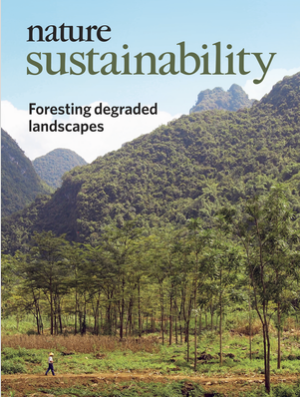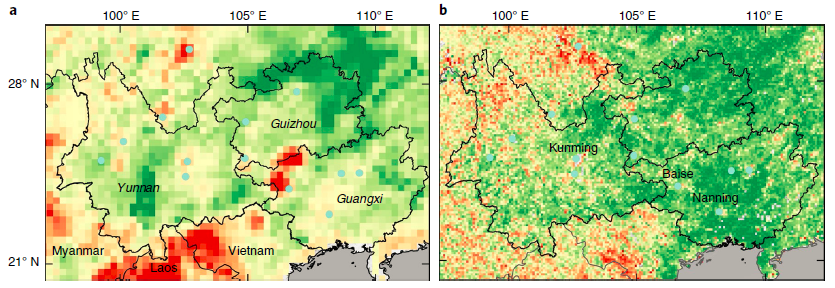Ecological Engineering Projects Increase Vegetation Growth and Carbon Stock in Southwest China
The highly sensitive and vulnerable karst ecosystem in southwest China is one of the largest exposed carbonate rock areas in the world.
Rocky desertification has been identified as the most severe ecological problem threatening ecosystem services in this area. To combat this severe form of land degradation and to relieve poverty, southwest China has been selected as a major target of restoration projects (the Natural Forest Protection Project, the Grain to Green Project, and the Karst Rocky Desertification Restoration Project) since the end of the 1990s.
It is important to quantify the success of such conservation efforts and to detect whether these conservation projects impact on the ability of vegetation to alleviate the effects of climate change at large scales.
Researchers from the Institute of Subtropical Agriculture, Chinese Academy of Sciences(ISA), University of Copenhagen, KU Leuven, University of Oklahoma, Institute of Biodiversity Science, Northern Arizona University, Tsinghua University and Boston University combined different satellite time series data to evaluate the impacts of conservation projects on vegetation growth and carbon stock across southwest China (Guangxi, Guizhou and Yunnan Province) in recent decades.
The researchers found a widespread increase in vegetation cover and aboveground biomass carbon, which contrasted negative trends found in the absence of anthropogenic influence as simulated by an ecosystem model. Moreover, the scholars also found that the positive vegetation trends observed in Southwest China aligned spatially with the Chinese national borders since the neighbouring countries Myanmar, Laos and Vietnam showed negative vegetation trends.
Despite drought conditions, the aboveground biomass carbon in Southwest China increased after the implementation of conservation areas after 2001 by ~9% to 4.7 Pg C in 2012 (+ 0.05 Pg C y-1).” said Dr. TONG in ISA.
Besides, the study found most vegetation and aboveground biomass carbon increase mainly happened in areas of high conservation effort. This shows that large scale conservation projects can contribute to a greening Earth with positive effects on carbon sequestration to mitigate climate change, and the projects may also reduce risks of desertification by increasing the vegetation cover and reducing the ecosystem sensitivity to climate perturbations.
The work was funded by the National Key Research and Development Program of China (No. 2016YFC0502400) and National Natural Science Foundation of China (No. 41471445, 41371418) and Science and Technology Service Network Initiative of Chinese Academy of Sciences (No. KFJ-STS-ZDTP-036), European Union’s Horizon 2020 Research and Innovation programme under Marie Sklodowska-Curie (No. 656564) and Danish Council for Independent Research (ID: DFF–6111-00258).
The study entitled "Increased vegetation growth and carbon stock in China karst via ecological engineering" has been published in the first issue of Nature Sustainability and as the cover paper.
Link: https://www.nature.com/natsustain/volumes/1/issues/1
Cover image: Foresting degraded landscapes:Southwest China is home to communities, agriculture and dramatic landscapes (pictured), but overuse of the land and drought have eroded regions bordering Vietman, Laos and Myanmar. Yue et al. analyse vegetation changes resulting from massive ecological engineering efforts, which since 2000 have promoted new forest growth and associated carbon storage.

Contact: WANG Kelin
E-mail: kelin@isa.ac.cn
Institute of Subtropical Agriculture, Chinese Academy of Sciences
Download attachments: